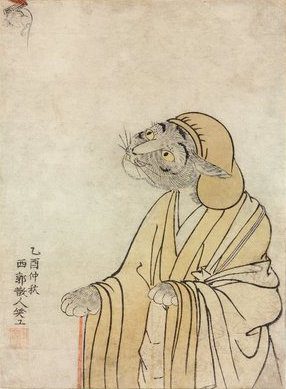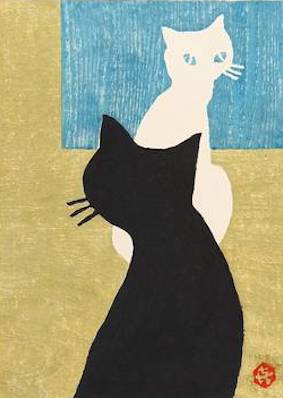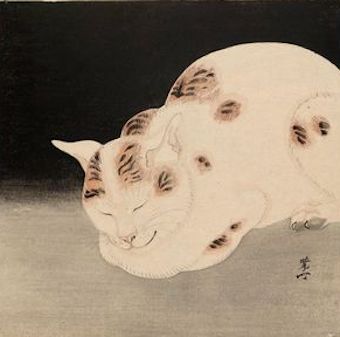Japan Art and Cats: Cat in Buddhist Robes
Lee Jay Walker
Modern Tokyo Times

Cats are the theme in this article concerning Japanese art. However, the above art piece by Okubo Tadanobu (1722-1777) is very intriguing, unlike the other two more natural settings of cats.
In traditional Japanese folklore, cats had a deeper negative angle. This concerns the corpse-eating cats (kasha), the shapeshifting (bakeneko) cat with one tail, and the two-tailed cat (nekomata).

Yet, in the art piece by Okubo Tadanobu, the cat is the protector of the written words of Buddhism. This concerns cats being brought to Japan in increasing numbers during the Nara Period (710-794) for a specific purpose. Accordingly, cats protected important Buddhist scrolls from gnawing rats.
Another unique trait of this stunning art piece is the chrysanthemums on the robes. Henceforth, another important connotation that links the Imperial Family with cats.

The second art piece is by Sasajima Kihei (1906-1993). From 1962, he focused on religious themes – in his art. For example, the Sacred Moutain and Fudo Myo-o (Buddhist Deity).
The final art piece of the Sleeping Cat is by Kawanabe Kyosai (1831-1889). He was independent in mind and thought. This reality shines right through the art of Kyosai.

Modern Tokyo News is part of the Modern Tokyo Times group
http://moderntokyotimes.com Modern Tokyo Times – International News and Japan News
http://sawakoart.com – Sawako Utsumi’s website and Modern Tokyo Times artist
https://moderntokyonews.com Modern Tokyo News – Tokyo News and International News
PLEASE JOIN ON TWITTER
https://twitter.com/MTT_News Modern Tokyo Times
PLEASE JOIN ON FACEBOOK